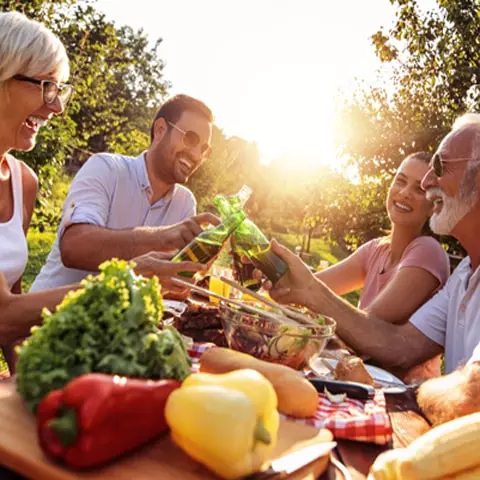
As we age, our nutritional needs change, and it becomes increasingly important to pay attention to our dietary intake. One essential mineral that often takes the spotlight in discussions about senior nutrition is zinc. While zinc is vital for people of all ages, it carries particular significance for the elderly. In this article, we'll explore the importance of zinc for older adults and why it's worth paying special attention to this nutrient.
Why zinc matters for seniors:
Immune function: Zinc plays a crucial role in maintaining a robust immune system. For seniors, whose immune function can weaken with age, ensuring an adequate intake of zinc is vital to ward off infections and illnesses.
Find YOUR ideal care home NOW!
Wound healing: Zinc is involved in wound healing and tissue repair. Seniors may face more health issues that require healing, such as surgery or skin conditions. Adequate zinc intake can speed up the healing process.
Cognitive health: Some research suggests that zinc may have a role in preserving cognitive function. While more studies are needed, ensuring proper zinc intake may help protect against cognitive decline.
Taste and smell: Age-related changes in taste and smell can lead to a decreased appetite and lower food intake. Zinc can help enhance taste perception, making food more appealing for seniors.
Antioxidant protection: Zinc acts as an antioxidant, protecting cells from damage caused by free radicals. This can help lower the risk of chronic diseases, which are more prevalent in older adults.
Sources of zinc:
Getting enough zinc can be achieved through dietary choices, and it's essential for seniors to include zinc-rich foods in their meals:
Lean meats: Beef, pork, and poultry are excellent sources of zinc.
Seafood: Oysters, crab, lobster, and mussels are among the highest zinc providers.
Dairy products: Milk, cheese, and yogurt contain zinc.
Nuts and seeds: Almonds, cashews, and pumpkin seeds are good options.
Legumes: Beans, lentils, and chickpeas are plant-based sources of zinc.
Whole grains: Oats, wheat germ, and quinoa offer zinc.
Fortified cereals: Some cereals are fortified with zinc.
Zinc supplements: If it's challenging to get enough zinc from food, supplements may be considered. However, it's essential to consult a healthcare provider before starting any supplementation.
Cautions and considerations:
While zinc is crucial for health, excessive intake can lead to adverse effects, including digestive issues and interference with the absorption of other minerals like copper. Seniors should aim to meet their zinc needs through a balanced diet and consult with a healthcare provider before considering supplementation.
Zinc-Rich Foods for Seniors
| Food Category | Examples | Zinc Content (per 100g) |
|---|---|---|
| Lean Meats | Beef, pork, chicken | 4.8 - 8.5 mg |
| Seafood | Oysters, crab, lobster | 7 - 75 mg |
| Dairy Products | Milk, cheese, yogurt | 0.5 - 3 mg |
| Nuts & Seeds | Almonds, cashews, pumpkin seeds | 2 - 8 mg |
| Legumes | Beans, lentils, chickpeas | 1 - 2.5 mg |
| Whole Grains | Oats, wheat germ, quinoa | 1 - 3 mg |
In conclusion, zinc is a nutrient that deserves attention in the diet of older adults. It plays a vital role in immune function, wound healing, and overall health. Seniors should focus on a well-balanced diet that includes zinc-rich foods, as this can contribute to a healthier and more vibrant lifestyle as they age.
FAQ:
What are the signs of zinc deficiency in seniors?
Common symptoms include weakened immunity, slow wound healing, loss of appetite, poor sense of taste or smell, and increased susceptibility to infections.
Can too much zinc be harmful?
Yes, excessive zinc intake can lead to nausea, digestive discomfort, and interference with copper absorption, which may cause neurological issues. Seniors should stay within the recommended intake limits.
Are plant-based sources of zinc sufficient for seniors?
While plant-based sources contain zinc, they also have compounds like phytates that can reduce absorption. Seniors following a plant-based diet should ensure adequate intake through a variety of sources and consider supplementation if necessary.
Should seniors take zinc supplements?
Zinc supplements can be beneficial if dietary intake is insufficient, but seniors should consult a healthcare provider before starting supplementation to avoid excessive intake.
We are here to help you choose a care home or facility best suited to your needs. Do not hesitate to contact us on the following number: 0230 608 0055 or fill out this form.
Do you need a care home for yourself or your loved one?
Share this article :
Latest posts
You are looking for an establishment for your loved one ?
Get availability & prices
Fill in this form and receive
all the essential information
We would like to inform you of the existence of the opposition list for telephone canvassing.

.webp)









